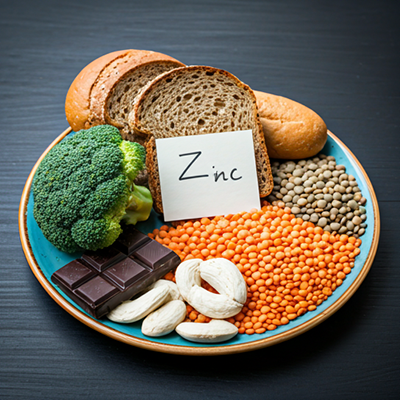Contents
Zinc (Zn) is needed for RNA and DNA formation, and synthesis of proteins. A element in over 200 enzymes, zinc is in every body cell. It functions in more enzyme reactions than any other mineral. Also, crucial to many hormones, it is primarily stored in the muscles and is highly concentrated in red and white blood cells. It is extremely important during fetal development and results in premature births, low birth weight, growth retardation, and pre-eclampsia.
Zinc is in insulin, so is involved in carbohydrate and energy metabolism. It is needed for normal development of reproductive organs and the function of the prostate. It also speeds up healing of burns and wounds and it is needed for vitamin A metabolism. This trace mineral is helpful in treating acne, macular degeneration, Alzheimer’s disease, and Wilson’s disease.

Zinc Sources
- Nova Scotia dulse
- Norwegian kelp
- Pumpkin seeds
- Ginger root
- Pecans
- Split peas
- Brazil nuts
- Whole wheat
- Rye
- Oats
- Peanuts
- Lima beans
- Almonds
- Walnuts
- Buckwheat
- Various vegetables
Zinc in grains and seeds tends to be locked by phytin but is unlocked by the fermentation process (when making bread) and by sprouting seeds.
Deficiency Symptoms
Skin changes, diarrhea, mental disturbances, recurrent infections. The elderly are most likely to have marginal zinc deficiencies. Other problems caused by lack of this mineral include sleep and behavior disturbances, psychiatric illness, growth retardation, loss of sense of smell or taste, night blindness, abnormal menstruation, alcohol abuse, rheumatoid arthritis, delayed wound healing, mouth ulcers, a white coating on the tongue, and marked halitosis.
Deficiency in this mineral also causes birth defects, stunted growth, reproductive problems, lowered resistance to infections, slow healing of wounds and skin diseases, white spots on finger and toenails, poor sense of smell and taste. Lethargy, apathy, dandruff, hair loss, atherosclerosis, epilepsy, and osteoporosis.
Causes of Deficiency
- Alcoholism
- Old age
- Anorexia nervosa
- Protein deficiency
- Acute infections
- Burns
- Chronic blood loss
- Pregnancy and lactation
- Oral contraceptives
- Growth spurts and puberty
- Diarrhea
- Liver disease
Supplementation
- All forms of zinc supplements are absorbed well.
Needed for Assimilation
- Vitamin B6
- Calcium
- Phosphorus
- Copper
Cautions
The toxic effects of zinc occur with prolonged intake of more than 150 mg (about the weight of five grains of rice) daily. This is rare; since vomiting usually occurs and flushes out excess amounts. Zinc is probably the least toxic mineral and does not negatively react with any drug. If taken on an empty stomach, zinc (especially zinc sulfate) supplementation can result in stomach upset and nausea. High dosages of other minerals (especially calcium and iron) can reduce zinc absorption. For best absorption, zinc supplements are best taken apart from high-fiber foods.
Dosage
RDA 15 mg (about half the weight of a grain of rice) / ODA 30 mg (about the weight of a grain of rice) / TDA 50 mg (about twice the weight of a grain of rice).
- Recommended: 15-20 mg daily, in addition to average food intake of 10 mg daily. Therapeutic dosage is 30-60 mg daily for men and 30-45 mg daily for women.
HEALTH DISCLAIMER: The information on this website is for educational uses only and is not a substitute for professional medical advice. Always consult an authorized healthcare provider for any health concerns before using any herbal or natural remedy. We do not establish, treat, cure, or prevent any disease. Reliance on any material from this website is solely at your own risk. We are not responsible for any adverse effects resulting from the use of information or products mentioned on this website.
REFERENCES
Vance Ferrell, Harold M. Cherne, M.D. 2010. The Natural Remedies Encyclopedia. Altamont : Harvestime Books, 2010. pp. 114. Vol. Seventh.
